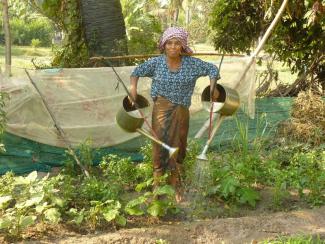School feeding
Contribution to nutrition security

Poverty has declined sharply in the Southeast Asian country, and nutrition security has improved considerably. However, infant mortality and morbidity have not been reduced in a proportionate way, and the mental and physical development of children still suffer because of poor eating habits.
For one thing, many people don‘t eat breakfast. Farming families typically eat their first warm meal around midday. The second problematic habit is overreliance on rice as the central component of the diet, which is common even among wealthy families. People eat hulled rice, which they supplement only scantily with protein and other ingredients rich in vitamins. This one-sided diet has a negative influence on the growth and overall health of children.
In this context, the provision of regular morning meals at school can have a big impact. Given that school attendance rates are very high in Cambodia, almost all boys and girls are reached. Many children, particularly those from poorer strata of society, either repeat years or drop out of school early. School feeding counteracts these trends. It promotes school success and ensures that more children go on to further schooling.
Discussions with programme participants conducted by researchers from the Institute for Development and Peace (INEF) of the University of Duisburg-Essen (see main text) painted a clear picture of success: at the school level, participants reported regular school attendance since school feeding was introduced. Previously, up to a third of children would simply „disappear“ from the classroom in order to get something to eat. The teachers report that the children are healthier and better able to concentrate. Significantly fewer are forced to repeat years, and hardly any children are taken out of school before classes are over.
The economic impact of procuring ingredients locally has been equally clear. The increase in purchasing power and in the demand for high-quality food like vegetables, fish, meat and eggs has encouraged villages to grow more vegetables in particular. The number of producers who are involved in the programme is remarkable: in a village with four participating schools, up to 200 households will be selling food. Finally, the programme has intensified interaction of teachers with parents and community representatives, and that benefits school life. (fb)







